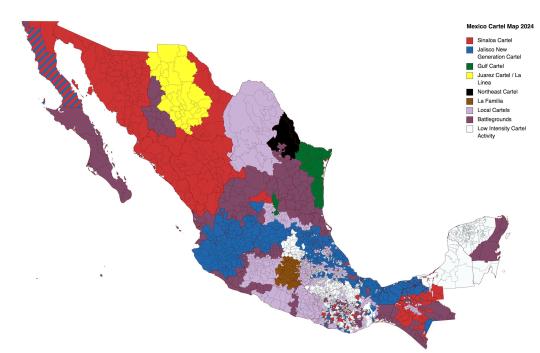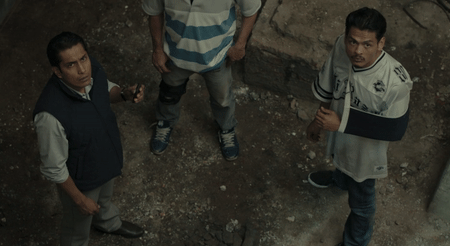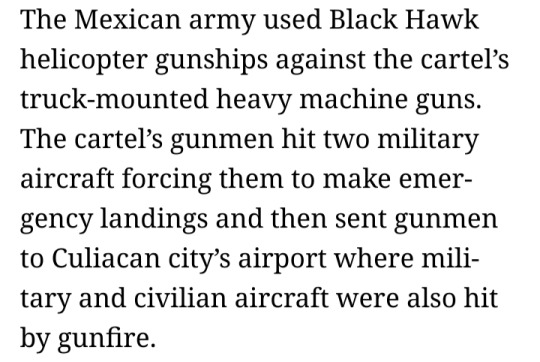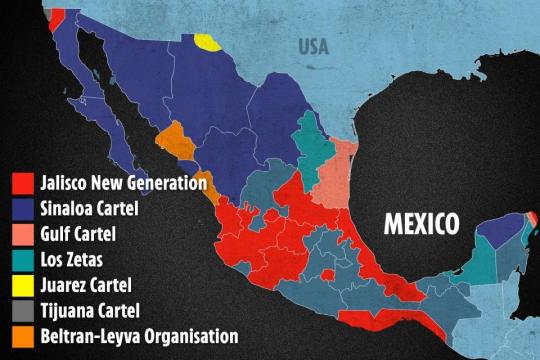#Drug cartels
Photo

Drug Cartels in Mexico 2024
113 notes
·
View notes
Text
Gov. Kristi Noem, a Trump lickspittle, is banned from 15% of her state of South Dakota. She is one of the contestants for the number two position on Trump's national ticket.
As South Dakota governor Kristi Noem vies for a top position in a second Trump White House, she appears to be more focused on shoring up her vice-presidential chances than on making allies at home — to the point that she is no longer welcome in around 15 percent of the state she governs.
Over the past few months, Noem has made several comments about alleged drug trafficking on Native American reservation lands, infuriating a number tribes in the state. In February, the Oglala Sioux Tribe banned her from the Pine Ridge Indian Reservation, the fifth largest in the United States, for claiming without evidence that drug cartels were connected to murders on the reservation.
The ban did not dissuade her from making more incendiary remarks. In March, Noem said at a community forum in Winner that there are “some tribal leaders that I believe are personally benefiting from cartels being there and that’s why they attack me every day.” When tribal leaders demanded an apology, Noem doubled down, issuing a statement to the tribes to “banish the cartels.” In response, the Cheyenne River Sioux forbade Noem from setting foot on their reservation, the fourth largest in the U.S. On Wednesday, the Standing Rock Sioux Tribe, the sixth largest in the U.S., banned her as well. On Thursday, a fourth tribe, the Rosebud Sioux, followed suit.
So far, four tribes are banning Noem:
Oglala Sioux
Rosebud Sioux
Cheyenne River Sioux
Standing Rock Sioux
Alleged drug cartels on tribal lands in South Dakota are the local equivalent of millions of migrants illegally voting in 2020. Bullshit is not just a GOP specialty but a dedicated lifestyle.
#south dakota#kristi noem#drug cartels#bullshit#tribal lands#native americans#noem banned on tribal lands#oglala sioux#standing rock sioux#rosebud sioux#cheyenne river sioux#donald trump#trump running mate#election 2024#vote blue no matter who
13 notes
·
View notes
Text




Tenoch Huerta Mejía as El Chino in Vuelven (2017), dir. Issa López
#he was a bad person in this but...so beautiful#true for so many tenoch characters#vuelven#tigers are not afraid#el chino#tenoch huerta#tenoch huerta mejia#films#my edits#mexico#mexican film#spanish speaking films#drug cartels
105 notes
·
View notes
Text
💥Battle Erupts on the streets of Culiacan in Mexico after the son of El Chapo Guzman, Ovidio Guzman, is Extradited to United States 💥

From an Al Jazeera report on the violence.
#cartel violence#mexico news#international news#world news#global news#drug cartels#violence in culiacan#socialism#communism#marxism leninism#socialist politics#socialist news#socialist worker#socialist revolution#socialist#communist#marxism#marxist leninist#progressive politics#politics#worker solidarity#workersolidarity#news#culiacan violence#culiacán#culiacan#mexico cartels
10 notes
·
View notes
Text
Rising GOP support for the U.S. taking unilateral military action in Mexico against drug cartels is increasingly rattling people on both sides of the border who worry talk of an attack is getting normalized.
Wednesday’s Republican presidential primary debate featured high-stakes policy disagreements on a range of issues from abortion to the environment — but found near-unanimous consensus on the idea of using American military force to fight drug smuggling and migration.
Florida Gov. Ron DeSantis made the strongest pledge on the stage with his response to Fox News moderator Martha MacCallum’s question asked whether he would support sending U.S. special forces into Mexico to “take out fentanyl labs, to take out drug cartel operations.”
“Yes. And I will do it on day one,” said DeSantis.
The Governor’s eagerness reflects a growing normalization of the idea, which Republicans have embraced from the campaign trail to the halls of Congress.
Even more moderate GOP candidates such as former United Nations Ambassador Nikki Haley and South Carolina Sen. Tim Scott have suggested support for some version of unilateral military action across the Rio Grande.
Former President Trump’s hawkish approach to the bilateral relationship has led the way in mainstreaming the idea. As President, he sought Pentagon advice on launching missiles into Mexico, according to “A Sacred Oath,” a memoir by former Defense Secretary Mark Esper.
Esper talked Trump down, but the proposal still casts a shadow on U.S.-Mexico relations.
“I believe any action that is unilateral by the United States vis-à-vis Mexico, especially by U.S. uniformed forces, be they police or military, would be completely counterproductive to United States-Mexico relations,” said John Negroponte, who served as permanent representative to the U.N. under President George W. Bush and as ambassador to Mexico under Presidents George H.W. Bush and Bill Clinton.
“Mexico is our largest trading partner. We share a 2,200-mile border and we have inter-relationships that are extensive and across an entire spectrum of issues such as migration, trade, people-to-people relations and environmental concerns. I believe such action would be extremely ill-advised,” Negroponte said.
Over the past century, bilateral relations have eased from the brink of war to deep collaboration on that catalog of issues, though many in Mexico remain distrustful of U.S. influence.
The last major U.S. military intervention in Mexico ended in 1917, as the latter country’s revolution entered its final phase. Known then as the “Punitive Expedition,” the mission led by Gen. John Pershing saw 10,000 U.S. combatants deployed to northern Mexico over the better part of a year.
Better commercial and cross-border relations came with decades of political stability in Mexico, culminating in the signature of the North American Free Trade Agreement (NAFTA) in 1992.
While cooperation has only intensified since then, open and direct collaboration between U.S. and Mexican security forces remains elusive; the Pentagon’s long-term goal of better integration with the Mexican military hit a speed bump amid Trump-related tensions.
But a century of progress could be erased overnight, a Mexican official told The Hill.
“Any military intervention in Mexico would be a monumental setback for the U.S. and would derail the bilateral relationship. It can destroy the North American trading bloc and worsen the security situation, triggering a wave of migration in the region.”
Now, bilateral tensions are being stimulated on both sides of the border, with Mexican President Andrés Manuel López Obrador pursuing an internal image of defiance against the United States.
“It’s been made worse obviously in the process by President López Obrador’s denial of Mexico’s role in fentanyl trafficking — the fact that he says that fentanyl isn’t produced in Mexico — which is absurd because its own armed forces parade seizures of labs and of fentanyl being produced in Mexico,” said Arturo Sarukhán, who served as Mexican ambassador to the United States from 2007-13.
“In many ways, López Obrador unwittingly has fanned the flames of anger, vis-à-vis Mexican positions on law enforcement collaboration, so it’s the perfect storm.”
Despite the political pressures that driven in part by a frantic search for solutions to the opioid epidemic, a few cooler heads remain.
On the debate stage Wednesday, former Arkansas Gov. Asa Hutchinson (R) opposed the unilateral use of U.S. military or police force in Mexico, harkening back to his experience as head of the Drug Enforcement Administration.
“We cannot be successful against the cartel unless we bring in Mexico as a partner. We have to use economic pressure to accomplish that,” said Hutchinson, though he added that López Obrador “has not been helpful.”
Former Vice President Mike Pence lauded Hutchinson’s appeal for economic pressure, but said he would “engage Mexico the exact same way” as the Trump administration to ensure security cooperation.
Hutchinson, who also served as the top border security official when the Department of Homeland Security was created in 2003, was more channeling the approach of the pre-Trump GOP.
“What Hutchinson said last night is a clear reminder of the way the GOP would go about addressing issues of transnational collaboration in the fight against transnational organized crime with countries like Mexico,” said Sarukhán.
But the post-Trump GOP, according to its opponents, is a ticking time bomb.
“I think what you’re seeing is the unraveling of a political party in real time,” said Texas Rep. Joaquín Castro, the top Democrat on the House Foreign Affairs Western Hemisphere Subcommittee.
The idea of unilateral military action is a placeholder for a lack of policy proposals in other fields, said Castro, but he warned the idea is already snowballing.
“What happens is, somebody popular in their party starts talking about it, and then the other candidates start parroting it. And after time, their base takes it on as a core idea and gets behind it.”
“And then the base starts demanding that every Republican in the country, whether they’re running for President or school board, agrees with this idea. And that’s the evolution of this whole thing. And that’s what’s gonna happen here. If something doesn’t change, that’s what’s gonna happen here.”
Pressed for further comment on DeSantis’s hard-line position, his campaign said “he will do what is necessary to stop the deadly flow of Fentanyl and other narcotics from the Mexican drug cartels.”
“Ron DeSantis rightly didn’t back down to the Experts(TM) during COVID and he likewise won’t let them keep him from securing our southern border,” said press secretary Bryan Griffin.
Former New Mexico Gov. Bill Richardson (D), a global crisis negotiator who served as U.S. permanent representative to the U.N. under Clinton, warned that military action in Mexico would both backfire and fail to solve the underlying issues.
“It shows the nativist shift of the Republican Party from internationalism to irresponsible diplomacy. It would be a disaster if there were any military action against Mexico — a foreign policy disaster for the United States,” he said.
“Plus, it makes no sense to resolve the problem,” Richardson added.
#us politics#news#republicans#conservatives#the hill#2024 presidential race#republican debate#2024 elections#foreign policy#us military#us mexico border#mexico#unilateral military action#drug cartels#war on drugs#fentanyl#Gov. Ron DeSantis#Nikki Haley#Sen. Tim Scott#Mark Esper#John Negroponte#North American Free Trade Agreement#President Andrés Manuel López Obrador#Arturo Sarukhán#Asa Hutchinson#drug enforcement administration#Mike Pence#gop platform#Rep. Joaquín Castro#Bill Richardson
11 notes
·
View notes
Text









Santa Muerte
https://www.instagram.com/sun_rust/
#my artwork#dark surrealism#artists on tumblr#fantastic#sculpture#polymerclay#body horror#hellraiser#clive barker#silent hill#rust#santa muerte#mexico#precolumbian#super sculpey#narcos#drug cartels
44 notes
·
View notes
Text
A candidate in Ecuador's forthcoming presidential election who campaigned against corruption and gangs has been shot dead at a campaign rally.
As bad as our system has gotten here, at least it's not *this* bad... yet
5 notes
·
View notes
Text
‘We are at war’: Ecuador’s president vows to crack down on gangs behind week of violence
I'm so glad someone is taking a hard stance against gangs. I'm rooting for the president.
1 note
·
View note
Text
💥💥💥
#fbi cover up#whistle blowers#drug cartels#exposing lies cover up crimes e-legal criminals#thé deep state cartel#crimes against humanity#these people are evil#speaktruth#fight for justice#standup#speak up#truth#please share#wwg1wga
73 notes
·
View notes
Photo

The mexican regions and their controller from the cartel organizations.
154 notes
·
View notes
Text
Through political and cultural analysis of representations of the so-called war on drugs, Oswaldo Zavala makes the case that the very terms we use to describe drug traffickers are a constructed subterfuge for the real narcos: politicians, corporations, and the military. Though Donald Trump's incendiary comments and monstrous policies on the border revealed the character of a deeply depraved leader, state violence on both sides of the border is nothing new. Immigration has endured as a prevailing news topic, but it is a fixture of modern society in the neoliberal era; the future will be one of exile brought on by state violence and the plundering of our natural resources to sate capitalist greed.
Yet the realities of violence in Mexico and along the border are obscured by the books, films, and TV series we consume. In truth, works like Sicario, The Queen of the South, and Narcos hide Mexico's political realities. Alongside these examples, Zavala discusses Charles Bowden, 2666 by Roberto Bolaño, and other important Latin American writers as examples of those who do capture the realities of the drug war.
Translated into English by William Savinar, Drug Cartels Do Not Exist will be useful for journalists, political scientists, philosophers, and writers of any kind who wish to break down the constructed barriers—physical and mental—created by those in power around the reality of the Mexican drug trade.
4 notes
·
View notes
Text
Interpol, Semar and FGR detain the nephew of Caro Quintero in Jalisco
ZAPOPAN, Jal. – The Attorney General’s Office (FGR) in collaboration with the Secretary of the Navy (SEMAR) arrested Rodrigo Omar Páez Quintero, nephew of drug trafficker Rafael Caro Quintero, for extradition purposes.
The FGR detailed that the Federal Ministerial Police and Interpol completed the arrest warrant against Rodrigo Páez Quintero for his probable responsibility for criminal…

View On WordPress
2 notes
·
View notes
Text
youtube
🇲🇽🇺🇲 Another fantastic video from our friend Ben Norton at Geopolitical Economy Report
#ben norton#geopolitical economy report#mexico#drug cartels#cartel violence#news#politics#us politics#us news#mexico news#world news#global news#international affairs#international news#international politics#geopolitics#geopolitics news#geopolitical events#geopolitical news#socialism#communism#marxism leninism#socialist politics#socialist news#socialist#communist#marxism#workersolidarity#worker solidarity#WorkerSolidarityNews
7 notes
·
View notes
Text
ICYMI: The Rookie x The Rookie Feds crossover promo ⬇️
#the rookie#the rookie feds#crossover event#new promo#in case you missed it#elijah stone#angela lopez#matthew garza#simone clark#abril rodas#drug cartels
3 notes
·
View notes
Text
Here's Why We Must Do Better Than Rule Of Law
Here's Why We Must Do Better Than Rule Of Law. The Rule of Law corrupts so easily. The opioid crisis proves why we must do better. A better world can't happen without changing the way we run worlds.
Photo by Sasun Bughdaryan on Unsplash
America’s biggest drug war has nothing to do with Mexican cartels or illicit drugs sold on inner-city ghetto street corners. Instead some of America’s biggest companies, including CVS, Walgreens, Walmart and Johnson & Johnson are directly decimating cities across America causing the opioid crisis. The tool making this decades-long destruction possible? The…

View On WordPress
#alternative economic systems#alternatives to capitalism#big pharma#capitalism#copiosis#drug cartels#moneyless economy#opioid crisis#society without money#wage slave#wage slavery
1 note
·
View note
